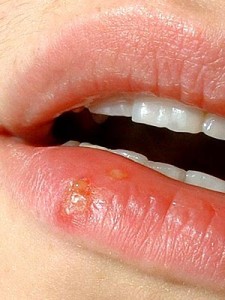
© Everyday Health, Inc.
Viral infections are very common among Americans for they are readily transmitted by saliva and other bodily fluids. The herpesviruses are the most frequent cause of viral infection in the mouth and herpes simplex virus (usually type 1) is the one responsible for cold sores.
What are cold sores?
Cold sores, fever blister or medically termed as herpes labialis is a common viral infection caused by the reactivation of the latent herpes simplex virus in the nerves after primary herpes infection. They are usually fluid-filled blisters or sores found on the lips or around the mouth and are not an inherited condition. Sometimes sores can appear on the chin, cheeks, in the nose or inside the mouth.
Cold sores can be mistaken as canker sores, another common oral condition, but both are very much different in their tendency to recur, in number and in duration. Canker sores are not caused by virus and are not contagious.
Do most people get cold sores?
About 40 million Americans get cold sores each year with most of them experiencing one to three attacks annually. Cold sores mostly affect adults and both genders are equally at risk. Most people contract the herpes simplex virus for the first time during their childhood which will remain in the nerves till it gets reactivated.
What causes cold sores?
After the primary infection by herpes simplex virus, the dormant virus can be reactivated in 20 to 30% of sufferers. Factors that can trigger reactivation of the virus include:
- Mild feverish infection such as common cold
- Ultraviolet light (exposure to strong sunlight)
- Mechanical trauma
- Hormonal changes (menstruation, pregnancy)
- Stress
- Weak immune system
Direct contact with cold sores can also spread the virus for the virus can enter through small breaks in the body.
What are the symptoms of cold sores?
Cold sores are usually found on the lips or around the mouth. Early symptoms include pain, tingling or itching on the affected area a few days after exposure. Small red spots will develop which will rapidly be filled with fluid. Blisters form after an hour or two, usually in clusters, at the junction of the lips but can extend to neighboring skin. As the blisters increase in size, they will rupture within a short time and leak fluid. Â A hard crust will form in their place after within 72 to 96 hours and heals without scarring. Widespread sores can be seen in those with weak immunity.
Are cold sores contagious?
Yes, cold sores can spread through saliva and direct contact with sores. Parents should wear gloves when applying antiviral drugs to sores on their children.
How to get rid of cold sores
Most cold sores will heal by themselves within one week to ten days but if the condition is uncomfortable and unsightly, medications may be prescribed by your doctor. There is no cure for cold sores. Treatment is meant to reduce the duration of cold sores and decrease the pain and uncomfortable symptoms.
Home remedies for cold sores include:
- Applying ice to the affected area to numb the tingling sensation and slow the development of sores
- Taking painkillers, for example acetaminophen and ibuprofen, to control the pain
- Products containing docosanol, for example Abreva, may stop the virus from entering skin cells during reactivation
- Ointments that contain benzocaine or lidocaine can help ease discomfort
- Avoid squeezing, pinching or picking at any sores
Your doctor will usually prescribe pencyclovir 1% cream or acyclovir 5% cream to apply in the early stages. Antivirals will only have maximum effect if given early in the disease but may be required for those with severe conditions, widespread or persistent sores, or those with weak immune systems.
When to see a doctor
Having cold sores is a normal occurrence but you will need to see a doctor when:
- You have symptoms involving the eyes
- You have severe symptoms and very frequent outbreaks
- The cold sores does not heal within two weeks
- You have a pre-existing medical condition that weakens your immune system
5 ways on how to avoid catching cold sores
- Avoid sharing personal items that comes in contact with the mouth, for example toothbrush, with others.
- Avoid triggering factors that can reactivate the virus, for example applying sunscreen to cold sores areas before long exposure to sunlight, avoid trauma to lips and manage stress.
- Avoid rubbing your eyes or touching other parts of your body if in contact with cold sores.
- Avoid kissing and skin contact with people having cold sores.
- Wash your hands thoroughly with soap and water after touching any cold sores.



Pingback: Cold Sores and Alzheimer's Disease | Intelligent Dental